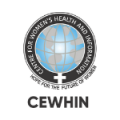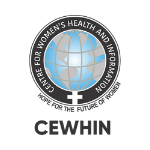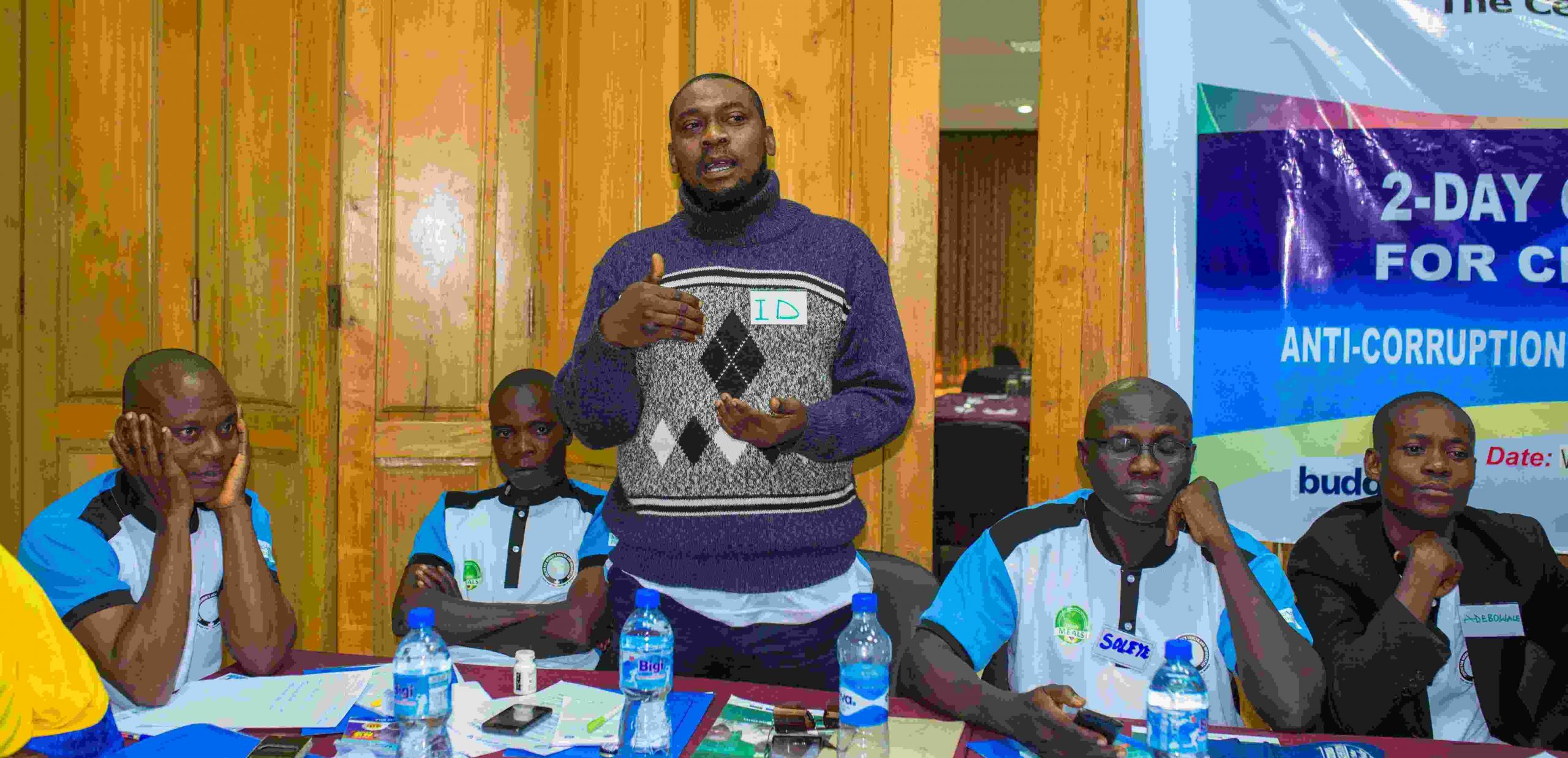With the support of MacArthur Foundation and in collaboration with BudgIT, CEWHIN organised a 2-day capacity building workshop for Civil Society Organisations in Ogun State on transparency and accountability. One of the objectives was to equip participants with skills for demanding for accountability from the government towards reducing corrupt practices especially in the delivery of services.
In June 2018 CEWHIN collaborated with BudgIT to organise a two-day capacity building workshop for the CEOs of 25 CSOs in Ogun State. The workshop was one of the activities of CEWHIN’s Transparency and Accountability Project funded by the MacArthur Foundation under its ON Nigeria Project. The workshop was designed for enhanced Citizens’ knowledge about the HGSFP and their role at ensuring that school pupils are not denied the benefits of government’s investment in the programme due to corruption.
CEWHIN organised a two-day capacity building workshop for Chief Executives of Civil Society Organisations in Ogun State on the 20th and 21st of June, 2018 with support from MacArthur Foundation as an activity under its Transparency and Accountability Project. The workshop which held at the Conference Hotel, GRA, Ijebu Ode, Ogun State was organised in collaboration with BudgIT.
OBJECTIVES
- To sensitize CSOs on the need to support the monitoring efforts of the Home Grown School Feeding Programme (HGSFP) in Ogun State
- To enhance participants’ knowledge of the dimensions, status and effects of corruption in Nigeria
- To update CSOs on the knowledge of current anti-corruption laws and mechanisms in Nigeria
- To enhance participants’ skills for effective and constructive engagement.
SESSIONS
The training was delivered in seven sessions as follows:
- Defining corruption – conceptual considerations
- Status of corruption in Nigeria; its effect on national development and citizens
- Anti – corruption laws and existing mechanisms in Nigeria
- Role of CSOs in the fight against corruption (TRACKA APROACH)
- Constructive engagement with government (use of data and social media foradvocacy)
- Overview of the HGSFP and the role of CEWHIN in monitoring itsimplementation
- Role of CSOs in monitoring the HGSFP
There an eye opener for many of the participants who expressed the fact that although they knew that corruption was a big issue for Nigeria, the presentations gave it a deeper meaning.
KEY HIGHLIGHTS OF SESSIONS
- For some of the citizens being accomplices in the crime of corruption, it is the environment that made it so, if you say you won’t give bribe to the police they would delay you and some of the passengers in your bus will tell you, you are too stubborn, give them and let us go. We are running for time.
- Monopoly in the services sector is responsible for corruption. If there are many people offering the same service, no one would ask for bribe in order to be patronized.
- The entitlement syndrome in some cultures (you get more of something because you are the eldest child, or the first son takes it all, or the elders must not be queried etc.) is identified to be one of the causes of corruption.
- Having a system that checks corruption is highly important, if not, anybody can fall victim
- If the people start insisting on doing what is right, corruption will be reduced “There should be policies and support for our entrepreneurship to grow.”
- As a nation we must develop ourselves to a level that we do not have to depend on foreigners for everything. “There should be policies and support for our entrepreneurship to grow.”
OUTPUTS OF THE WORKSHOP
- Enhanced capacity for recognizing and responding more effectively to corruption
- Enhanced capacity for demanding information from government using theFreedom of Information Act
- Skills acquisition for tracking and reporting corrupt practices using BudgiT TRACKA
- Commitment of CSOs to monitor implementation of the Home Grown School Feeding Programme
- Sustainable development network to advocate for the HGSFP to become a policy across Nigeria
OUTCOME OF THE WORKSHOP
- Following participation at the workshop some CSOs identified government- owned primary schools in their localities and commenced monitoring of the activities of the Cooks in such schools, ensuring that food is delivered in accordance with HGSFP standards.
IMMEDIATE FEEDBACK FOLLOWING TRAINING
The following are some of the remarks that the participants made at the end of the 2- day worksho
- “I can now use the F.O.I Act to find out what allocation is given to the rural communities in my state that they remained underdeveloped”
- “I will use the ACT to find out from the ministry of lands, how they do their allocations”
- “We have been challenged from here; the only thing we have to do now is to move and fight this cankerworm called corruption. Watching the video and listening to all these lectures, no one can remain the same”
- “If not for this workshop, we would not know the extent of the damage corruption has done in Africa”.
- “With this workshop I now know more than what I thought I knew about corruption”.
“I now know how deep corruption is”, it is not just the receiver of a bribe that is corrupt but the giver also”. - “Now I know that I do not need to focus on the government alone, on issues of corruption, it is also found, even in the home”.
CONCLUSION
The trained CSOs are enthusiastic about the implementation of the HGSFP particularly with regards to the lack of adequate information about the suppliers of the protein contents of the meals. With the skills acquired in demanding information from the government using the Freedom of Information Act, there is high expectation that engagement with the Ogun state government will ensue in earnest. The called on government to adopt a multi-stakeholder partnership approach to service delivery, looking inwards at the asset base of communities and their contributions to the programme.
CEWHIN COLLABORATES WITH BUDGIT TO TRAIN CEOS OF CSOS IN OGUN STATE ON ANTI-CORRUPTION
With the support of MacArthur Foundation and in collaboration with BudgIT, CEWHIN organised a 2-day capacity building workshop for Civil Society Organisations in Ogun State on transparency and accountability. One of the objectives was to equip participants with skills for demanding for accountability from the government towards reducing corrupt practices especially in the delivery of services.
In June 2018 CEWHIN collaborated with BudgIT to organise a two-day capacity building workshop for the CEOs of 25 CSOs in Ogun State. The workshop was one of the activities of CEWHIN’s Transparency and Accountability Project funded by the MacArthur Foundation under its ON Nigeria Project. The workshop was designed for enhanced Citizens’ knowledge about the HGSFP and their role at ensuring that school pupils are not denied the benefits of government’s investment in the programme due to corruption.
CEWHIN organised a two-day capacity building workshop for Chief Executives of Civil Society Organisations in Ogun State on the 20th and 21st of June, 2018 with support from MacArthur Foundation as an activity under its Transparency and Accountability Project. The workshop which held at the Conference Hotel, GRA, Ijebu Ode, Ogun State was organised in collaboration with BudgIT.
OBJECTIVES
- To sensitize CSOs on the need to support the monitoring efforts of the Home Grown School Feeding Programme (HGSFP) in Ogun State
- To enhance participants’ knowledge of the dimensions, status and effects of corruption in Nigeria
- To update CSOs on the knowledge of current anti-corruption laws and mechanisms in Nigeria
- To enhance participants’ skills for effective and constructive engagement.
SESSIONS
The training was delivered in seven sessions as follows:
- Defining corruption – conceptual considerations
- Status of corruption in Nigeria; its effect on national development and citizens
- Anti – corruption laws and existing mechanisms in Nigeria
- Role of CSOs in the fight against corruption (TRACKA APROACH)
- Constructive engagement with government (use of data and social media foradvocacy)
- Overview of the HGSFP and the role of CEWHIN in monitoring itsimplementation
- Role of CSOs in monitoring the HGSFP
There an eye opener for many of the participants who expressed the fact that although they knew that corruption was a big issue for Nigeria, the presentations gave it a deeper meaning.
KEY HIGHLIGHTS OF SESSIONS
- For some of the citizens being accomplices in the crime of corruption, it is the environment that made it so, if you say you won’t give bribe to the police they would delay you and some of the passengers in your bus will tell you, you are too stubborn, give them and let us go. We are running for time.
- Monopoly in the services sector is responsible for corruption. If there are many people offering the same service, no one would ask for bribe in order to be patronized.
- The entitlement syndrome in some cultures (you get more of something because you are the eldest child, or the first son takes it all, or the elders must not be queried etc.) is identified to be one of the causes of corruption.
- Having a system that checks corruption is highly important, if not, anybody can fall victim
- If the people start insisting on doing what is right, corruption will be reduced “There should be policies and support for our entrepreneurship to grow.”
- As a nation we must develop ourselves to a level that we do not have to depend on foreigners for everything. “There should be policies and support for our entrepreneurship to grow.”
OUTPUTS OF THE WORKSHOP
- Enhanced capacity for recognizing and responding more effectively to corruption
- Enhanced capacity for demanding information from government using theFreedom of Information Act
- Skills acquisition for tracking and reporting corrupt practices using BudgiT TRACKA
- Commitment of CSOs to monitor implementation of the Home Grown School Feeding Programme
- Sustainable development network to advocate for the HGSFP to become a policy across Nigeria
OUTCOME OF THE WORKSHOP
- Following participation at the workshop some CSOs identified government- owned primary schools in their localities and commenced monitoring of the activities of the Cooks in such schools, ensuring that food is delivered in accordance with HGSFP standards.
IMMEDIATE FEEDBACK FOLLOWING TRAINING
The following are some of the remarks that the participants made at the end of the 2- day worksho
- “I can now use the F.O.I Act to find out what allocation is given to the rural communities in my state that they remained underdeveloped”
- “I will use the ACT to find out from the ministry of lands, how they do their allocations”
- “We have been challenged from here; the only thing we have to do now is to move and fight this cankerworm called corruption. Watching the video and listening to all these lectures, no one can remain the same”
- “If not for this workshop, we would not know the extent of the damage corruption has done in Africa”.
- “With this workshop I now know more than what I thought I knew about corruption”.
“I now know how deep corruption is”, it is not just the receiver of a bribe that is corrupt but the giver also”. - “Now I know that I do not need to focus on the government alone, on issues of corruption, it is also found, even in the home”.
CONCLUSION
The trained CSOs are enthusiastic about the implementation of the HGSFP particularly with regards to the lack of adequate information about the suppliers of the protein contents of the meals. With the skills acquired in demanding information from the government using the Freedom of Information Act, there is high expectation that engagement with the Ogun state government will ensue in earnest. The called on government to adopt a multi-stakeholder partnership approach to service delivery, looking inwards at the asset base of communities and their contributions to the programme.








CEWHIN COLLABORATES WITH BUDGIT TO TRAIN CEOS OF CSOS IN OGUN STATE ON ANTI-CORRUPTION
With the support of MacArthur Foundation and in collaboration with BudgIT, CEWHIN organised a 2-day capacity building workshop for Civil Society Organisations in Ogun State on transparency and accountability. One of the objectives was to equip participants with skills for demanding for accountability from the government towards reducing corrupt practices especially in the delivery of services.
In June 2018 CEWHIN collaborated with BudgIT to organise a two-day capacity building workshop for the CEOs of 25 CSOs in Ogun State. The workshop was one of the activities of CEWHIN’s Transparency and Accountability Project funded by the MacArthur Foundation under its ON Nigeria Project. The workshop was designed for enhanced Citizens’ knowledge about the HGSFP and their role at ensuring that school pupils are not denied the benefits of government’s investment in the programme due to corruption.
CEWHIN organised a two-day capacity building workshop for Chief Executives of Civil Society Organisations in Ogun State on the 20th and 21st of June, 2018 with support from MacArthur Foundation as an activity under its Transparency and Accountability Project. The workshop which held at the Conference Hotel, GRA, Ijebu Ode, Ogun State was organised in collaboration with BudgIT.
OBJECTIVES
- To sensitize CSOs on the need to support the monitoring efforts of the Home Grown School Feeding Programme (HGSFP) in Ogun State
- To enhance participants’ knowledge of the dimensions, status and effects of corruption in Nigeria
- To update CSOs on the knowledge of current anti-corruption laws and mechanisms in Nigeria
- To enhance participants’ skills for effective and constructive engagement.
SESSIONS
The training was delivered in seven sessions as follows:
- Defining corruption – conceptual considerations
- Status of corruption in Nigeria; its effect on national development and citizens
- Anti – corruption laws and existing mechanisms in Nigeria
- Role of CSOs in the fight against corruption (TRACKA APROACH)
- Constructive engagement with government (use of data and social media foradvocacy)
- Overview of the HGSFP and the role of CEWHIN in monitoring itsimplementation
- Role of CSOs in monitoring the HGSFP
There an eye opener for many of the participants who expressed the fact that although they knew that corruption was a big issue for Nigeria, the presentations gave it a deeper meaning.
KEY HIGHLIGHTS OF SESSIONS
- For some of the citizens being accomplices in the crime of corruption, it is the environment that made it so, if you say you won’t give bribe to the police they would delay you and some of the passengers in your bus will tell you, you are too stubborn, give them and let us go. We are running for time.
- Monopoly in the services sector is responsible for corruption. If there are many people offering the same service, no one would ask for bribe in order to be patronized.
- The entitlement syndrome in some cultures (you get more of something because you are the eldest child, or the first son takes it all, or the elders must not be queried etc.) is identified to be one of the causes of corruption.
- Having a system that checks corruption is highly important, if not, anybody can fall victim
- If the people start insisting on doing what is right, corruption will be reduced “There should be policies and support for our entrepreneurship to grow.”
- As a nation we must develop ourselves to a level that we do not have to depend on foreigners for everything. “There should be policies and support for our entrepreneurship to grow.”
OUTPUTS OF THE WORKSHOP
- Enhanced capacity for recognizing and responding more effectively to corruption
- Enhanced capacity for demanding information from government using theFreedom of Information Act
- Skills acquisition for tracking and reporting corrupt practices using BudgiT TRACKA
- Commitment of CSOs to monitor implementation of the Home Grown School Feeding Programme
- Sustainable development network to advocate for the HGSFP to become a policy across Nigeria
OUTCOME OF THE WORKSHOP
- Following participation at the workshop some CSOs identified government- owned primary schools in their localities and commenced monitoring of the activities of the Cooks in such schools, ensuring that food is delivered in accordance with HGSFP standards.
IMMEDIATE FEEDBACK FOLLOWING TRAINING
The following are some of the remarks that the participants made at the end of the 2- day worksho
- “I can now use the F.O.I Act to find out what allocation is given to the rural communities in my state that they remained underdeveloped”
- “I will use the ACT to find out from the ministry of lands, how they do their allocations”
- “We have been challenged from here; the only thing we have to do now is to move and fight this cankerworm called corruption. Watching the video and listening to all these lectures, no one can remain the same”
- “If not for this workshop, we would not know the extent of the damage corruption has done in Africa”.
- “With this workshop I now know more than what I thought I knew about corruption”.
“I now know how deep corruption is”, it is not just the receiver of a bribe that is corrupt but the giver also”. - “Now I know that I do not need to focus on the government alone, on issues of corruption, it is also found, even in the home”.
CONCLUSION
The trained CSOs are enthusiastic about the implementation of the HGSFP particularly with regards to the lack of adequate information about the suppliers of the protein contents of the meals. With the skills acquired in demanding information from the government using the Freedom of Information Act, there is high expectation that engagement with the Ogun state government will ensue in earnest. The called on government to adopt a multi-stakeholder partnership approach to service delivery, looking inwards at the asset base of communities and their contributions to the programme.










